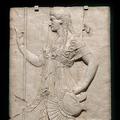003 Sagunti vastatio
003 Die Zerstörung von Sagunto
003
003 Devastación de Sagunto
003 La distruzione di Sagunto
003 De vernietiging van Sagunto
003 A destruição de Sagunto
003 Руйнування Сагунто
Sagunti vastatio
The destruction of Sagunto.
La devastación respiro
Post primum bellum Punicum Poeni in Hispaniam navigant, parati terram magnam et pulchram et frugiferam expugnare.
Nach dem ersten punischen Krieg segelte das punische Volk nach Spanien, bereit, ein großes, schönes und fruchtbares Land zu erobern.
After the first Punic war, the Punic people set sail for Spain, ready to conquer a large and beautiful and fertile land.
Después de la primera guerra púnica, los cartagineses zarparon hacia España, estando preparados para desembarcar la mujer grande y hermosa, y los fructíferos se comprometieron a luchar con ellos.
Post excidium nonnullorum oppidorum parvorum Saguntum oppugnant, oppidum natura et muris firmum.
Nach der Zerstörung einiger Kleinstädte greifen sie Sagunt an, eine durch Natur und Mauern befestigte Stadt.
After the destruction of some small towns, they attack Saguntus, a town fortified by nature and walls.
Después de la destrucción de Saguntum fue de algunos de los pueblos de los pequeños que están luchando, y las murallas y el pueblo de la naturaleza de la empresa.
Saguntini freti dis et causa iusta diu fortiter pugnant.
Die Saguntiner, die sich auf Drängen und gerechte Sache verlassen, kämpfen lange Zeit tapfer.
The Saguntines, relying on push and just cause, fight bravely for a long time.
Y por qué el solo hecho de depender de los aliados empuja con fuerza para una lucha larga.
Tandem Poeni per ruinam muri in oppidum intrant.
At length the Poeni enter the town through the fall of the wall.
Al fin, mediante la destrucción de las murallas, en la ciudad de los cartagineses para entrar.
Misera est fortuna oppidanorum: magnum numerum Poeni gladiis obtruncant; ne pueros teneros quidem et feminas imbecillas conservant.
The fortune of the townspeople is wretched: the Phoenicians cut down a great number of them with swords; they do not even keep (spare) young children and weak women.
Es una desgracia la fortuna de los ciudadanos: un gran número de cartagineses fueron asesinados a espada; mujeres con niños pequeños, y no teman débiles, de hecho, para protegerlo.
Exempla:
examples:
Vulgus indoctum ludi magnopere delectant.
Ungebildete Menschen genießen das Spiel sehr.
The uneducated people enjoy the game very much.
La gente común de la ignorancia para disfrutar de este juego.
Aegyptus admodum fecunda est.
Ägypten ist sehr fruchtbar.
Egypt is very fertile.
Egipto es muy fecundo.
Cyprus multis et pulchris oppidis clara est.
Zypern ist berühmt für seine vielen schönen Städte.
Cyprus is famous for many beautiful towns.
Chipre, muchas ciudades y un hermoso sol.
Corinthus, oppidum magnum et opulentum, inter Peloponnesum et Atticam sita est.
Corinth, a large and wealthy town, is situated between the Peloponnese and Attica.
Junto al de Corinto, la ciudad de los grandes y ricos, entre el Peloponeso y el Ática donde se encuentra.
Humus Siciliae non minus fecunda est quam Aegypti.
The soil of Sicily is not less fertile than that of Egypt.
Grupo de Sicilia y de su fecundidad no es menor que la de Egipto.
Umbra fagorum ramosarum agricolas fessos recreat.
Der Schatten der Buchenzweige erfrischt die müden Bauern.
The shade of the branches of beech trees refreshes the weary farmers.
Las ramas de hayas para los jardineros de sombra son refrescantes agotados.
In viis magna copia procerarum populorum est.
Auf den Straßen sind viele edle Menschen unterwegs.
There is a great number of noble people in the streets.
La forma en que una gran cantidad de personas altas.
Cunctis carus est locus, ubi nati sunt.
Der Ort, an dem sie geboren wurden, liegt allen am Herzen.
The place where they were born is dear to all.
Todo querido lugar donde nacieron.
Multa loca Italiae natura amoena sunt.
Viele Orte in Italien sind von Natur aus wunderschön.
Many places in Italy are beautiful by nature.
Muchos lugares son acogedores naturaleza italiana.
Magnopere, Quintili Vare, Augustus copias suas desiderat.
Sehr gern, Quintilus Vare, Augustus braucht seine Truppen.
Greatly, Quintili Vare, Augustus wants his troops.
Grandes hechos de julio, Augusto obliga a sus deseos.

